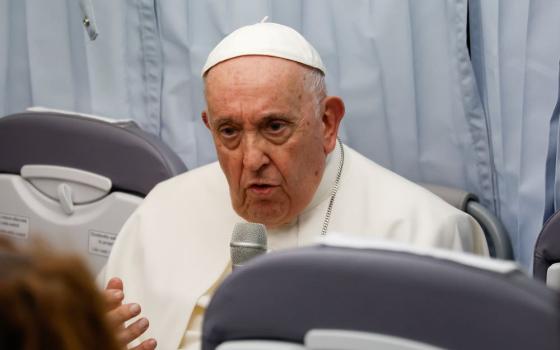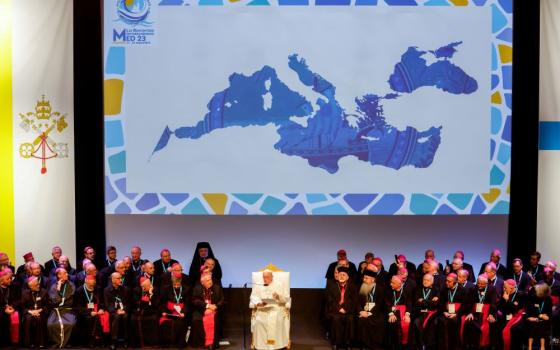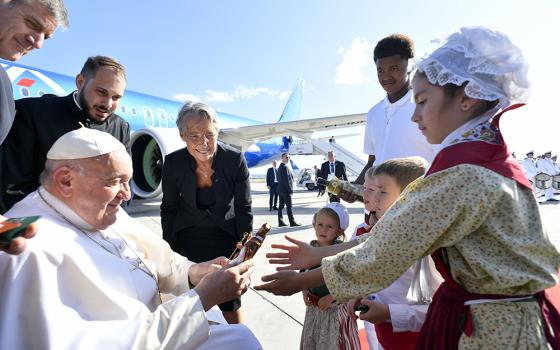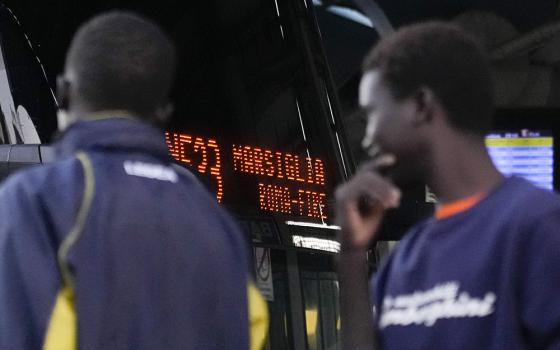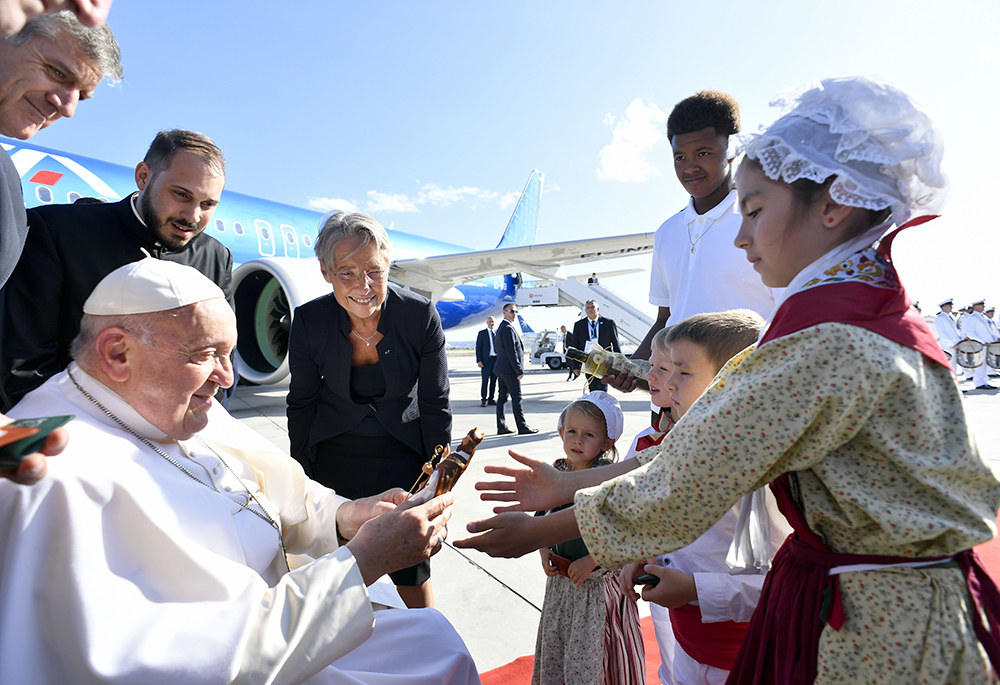
Four children and a young man give Pope Francis gifts while French Prime Minister Élisabeth Borne looks on during a brief welcoming ceremony at Marseille International Airport Sept. 22 in Marseille, France. (CNS/Vatican Media)
Amid rising tensions among European leaders over how to respond to a new influx of migrants, Pope Francis on Sept. 22 arrived in the French port city of Marseille, warning that civilization is at a crossroads and must choose between the "fanaticism of indifference" or solidarity with those seeking welcome on new shores.
"On the one hand, there is fraternity, which makes the human community flourish with goodness; on the other, indifference, which bloodies the Mediterranean," the pope said during a meeting with other religious leaders outside a memorial to migrants lost at sea.
"We find ourselves at a crossroads of civilization," he cautioned, gazing out from the memorial over the Mediterranean, where more than 27,000 migrants have died attempting to reach Europe since 2014.
Migration has been a central issue to Francis' decadelong papacy. He used his inaugural trip outside of Rome as pontiff in 2013, to the Italian island of Lampedusa, to spotlight the plight of migrants.
Despite mobility issues and a preference for avoiding traveling to major European countries, the 86-year-old pope chose to make a brief overnight visit here — his 44th trip abroad — to participate in a gathering of Catholic bishops and young people from around the Mediterranean, organized to discuss migration concerns.
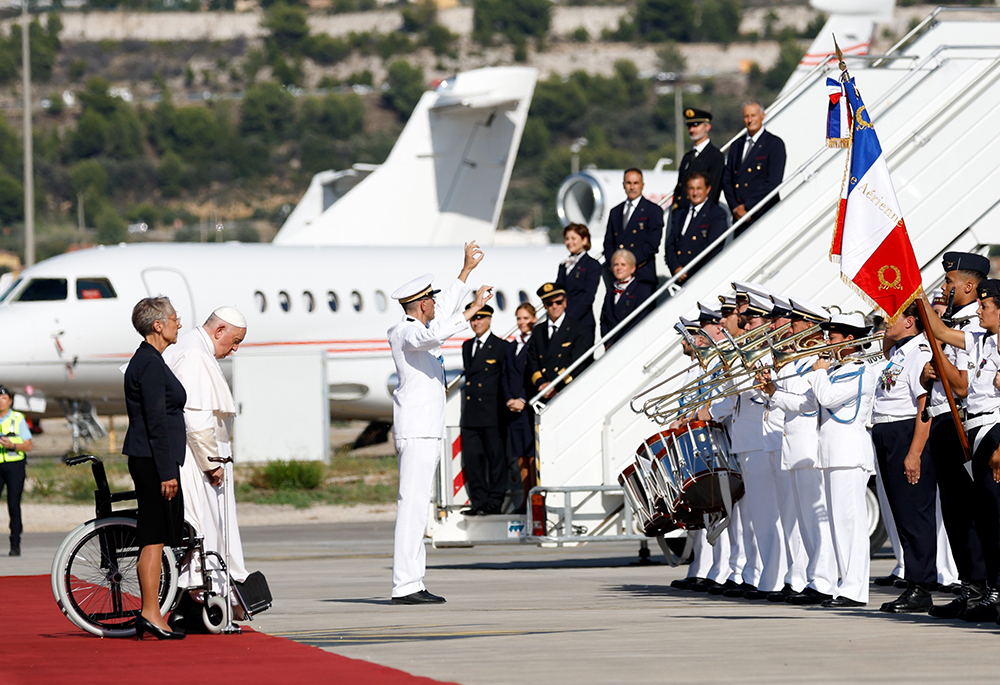
Pope Francis stands with French Prime Minister Élisabeth Borne while the French and Vatican national anthems are played after the pope arrived at Marseille International Airport Sept. 22 in Marseille, France. (CNS/Lola Gomez)
"We cannot be resigned to seeing human beings treated as bargaining chips, imprisoned and tortured in atrocious ways," said the pope, as he gathered with interreligious leaders at a memorial dedicated to sailors and migrants lost at sea. "We can no longer watch the drama of shipwrecks, caused by the cruel trafficking and the fanaticism of indifference."
Both the pope's words and the setting harkened back to the Lampedusa visit a decade ago, where he condemned the "globalized indifference" to the plight of migrants, before tossing a wreath in the choppy waters of the Mediterranean to commemorate their lives.
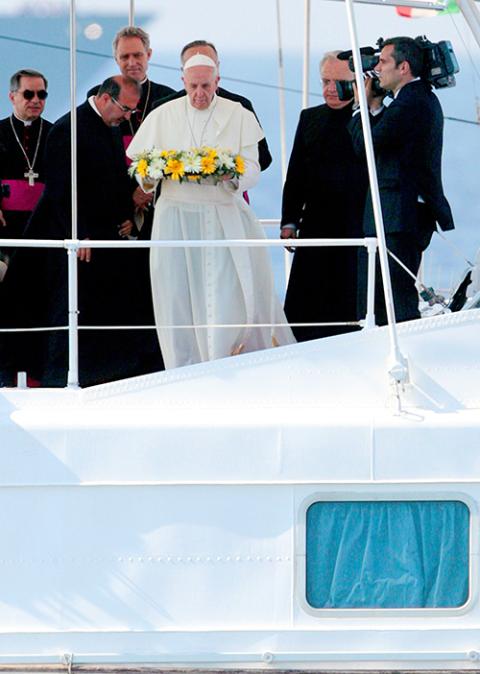
Pope Francis tosses a wreath of flowers into the Mediterranean Sea off the Italian island of Lampedusa in this July 8, 2013, file photo. The pope threw a wreath to honor the memory of immigrants who have died trying to cross from Africa to Europe. (CNS/pool)
Ten years later — and less than two weeks after some 8,500 migrants from North Africa arrived on the shores of Lampedusa over the course of just three days — the defiant, if exasperated, pope's message remained the same.
"People who are at risk of drowning when abandoned on the waves must be rescued," Francis pleaded. "It is a duty of humanity; it is a duty of civilization!"
Over the last year, according to U.N. data, over 178,500 new arrivals have crossed the Mediterranean seeking refuge in Europe. This year alone, more than 2,500 have died at sea.
"Let us not get used to considering shipwrecks as news stories, and deaths at sea as numbers," urged the pope. "No, they are names and surnames, they are faces and stories, they are broken lives and shattered dreams."
"Faced with such a drama, we need deeds, not words," he said.
During his first few hours here in Marseille, the pope targeted that message primarily toward religious leaders, ahead of scheduled meetings for Sept. 23 with both religious and political leaders.
Alongside Jewish and Islamic representatives, the pope appealed to the shared values of all three Mediterranean monotheistic religions, which he described as "hospitality" and "love for the stranger in the name of God."
"God will bless us, if on land and at sea we know how to take care of the weakest, if we can overcome the paralysis of fear and the disinterest that, with velvet gloves, condemns others to death," he heeded.
Advertisement
Prior to his reflections at the migrants memorial, Francis presided over a brief prayer service at the city's iconic Basilica of Our Lady of the Guard that sits high above Marseille's historic port, overlooking the Mediterranean.
While French Catholics are sharply divided over the issue of migration, the pope told the local priests that their ministries should be defined by their compassion towards others.
"Let us open the doors, not only of churches and rectories, but especially of the heart, to show through our meekness, kindness and acceptance the face of our Lord," he said.
On Sept. 23, Francis will begin his day by having breakfast with individuals experiencing economic difficulties. He will later give closing remarks at the Mediterranean summit on migration, and hold a private meeting with French President Emmanuel Macron. He will then celebrate a Mass at Marseille's major soccer stadium, which is expected to attract over 50,000 Catholics.
During the brief one hour and 15-minute flight from Rome on Sept. 22, the pope greeted journalists for nearly 20 minutes, where he lamented the current situation in Lampedusa as "cruel." He also offered unsolicited praise for U.S. border Bishop Mark Seitz of El Paso, Texas, known as a champion of migrants and refugees.
At the migrant memorial in Marseille, Francis pleaded: "Brothers, sisters, let us face these problems together. Let us not cause hope to shipwreck; let us together make a mosaic of peace!"





